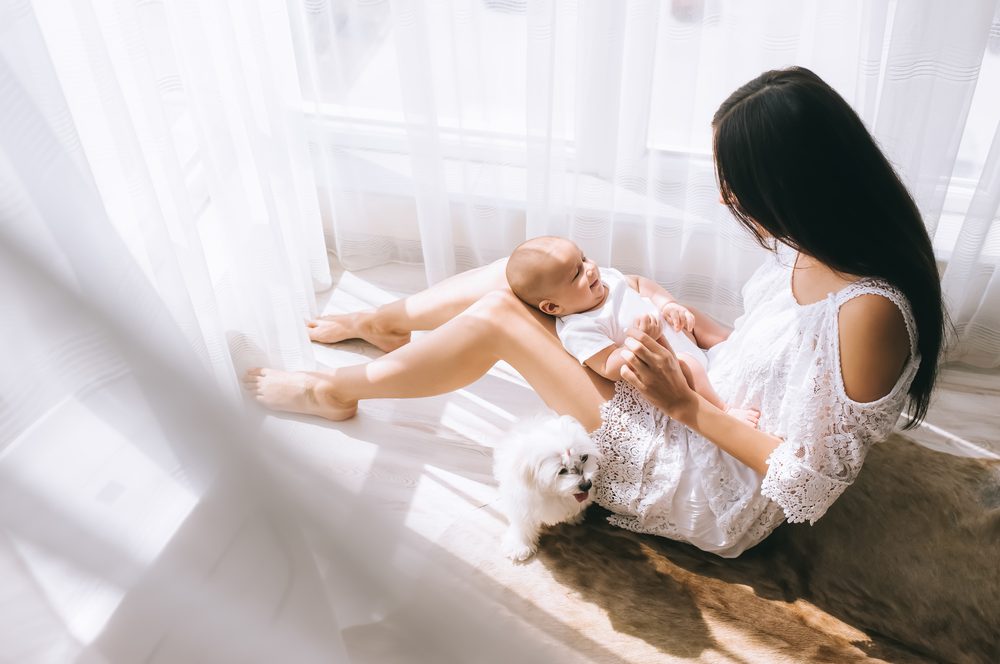No matter how well you plan ahead, a new family member will be stressful for your family pet. The key to babies and pets is to make sure that you keep all training and baby-related matters a positive experience. Remember your dog or cat is used to being the centre of attention. It is understandable that they may experience something like sibling rivalry with a new baby. By following a few simple steps, you will help your pet welcome the new arrival into their pack.
Working with Pets Before Baby Arrives
Work with your pet months before the arrival of the babies. Gradually get your pet used to spending less time with you. Decreased attention after your babies arrive will likely result in stress for your pet. If Fido is particularly attached to the new mother, another family member should develop a closer relationship with him so the animal will be loved and provided for when mum is busy with the baby.
Preparation before the babies arrive is really important. Take your pet to the veterinarian for a routine health exam and to update his vaccinations. You should spay or neuter your pet; he will be calmer and likely have fewer health problems.
Address Behavioural Problems in Animals
Address any behavioral or training problems with an animal trainer if necessary. Get your pet used to having his nails trimmed, get your pet accustomed to being asked to get off your lap and instead have him remain calmly beside you. Also, strongly discourage your pet from jumping up on furniture or sleeping with you. Discourage your pet from going into the nursery, even with a removable gate and decide whether your animal will be an in- or outdoor pet. Start making these changes months before the babies arrive.
Invite Babies and Kids to Visit Your Pet
Encourage friends and family with children and babies to visit so your pet becomes accustomed to them. Accustomize your pet to baby-related noises such as a baby crying or a baby swing, carry a swaddled doll to get your pet used to the real thing and sprinkle your skin with baby products so your pet gets used to new smells. It’s a good idea to assemble all of your baby equipment ahead of time so your pet can get used to the spatial changes in the house.
While You are in Hospital
Make sure you make plans for your pet’s care when you are in the hospital and while you are there have your partner or friend bring home something with the babies’ scents on it for your pet to investigate.
Coming Home from the Hospital
When you come home from the hospital, greet your pet calmly and away from the babies. When you introduce your newborns, begin introductions gradually with a leash, two people and a lot of praise and cookies.
Do your best to minimize disruption by maintaining your pet’s daily routine of walks and meals and give them a quiet place to escape to when the house gets noisy or there are lots of visitors. Keep soiled diapers in a sealed container.
Baby Allergic to Pets
Suspected allergies to pets may be reactions to laundry detergents and new foods – consult your doctor if you notice anything develop. Look for territorial signs from your pet such as guarding food; a crawling baby may be entering territory that could trigger aggressive behavior. Do not let your toddlers use your pet as a guide to walking.
Never leave your babies alone with a pet unsupervised.
Toxoplasmosis
Toxoplasmosis is a rare occurrence and is easily avoided. The disease-causing parasite can be found in the feces of cats that ingest raw meat, birds, mice or contaminated soil but the pathogen is more commonly found in undercooked meat. In the rare event that you were exposed during pregnancy, ask your obstetrician for a blood test. If it is positive you will be given medication and your babies may be tested and treated after birth. Toxoplasmosis can be avoided if you practice food safety, keep your cat away from wildlife, have someone else clean the litter box and feed cats only commercially prepared cat food.




You’ve hit the ball out the park! Incedrbile!
Hi Jill, you have put together a very thoughtful post here. When I got my baby home we went through a rough time while getting my boxer used to the baby. Needless to say if we had known how to handle the situation things would have straightened out faster.